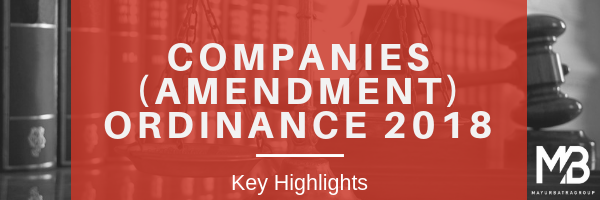The President of India had on November 02, 2018 promulgated The Companies (Amendment) Ordinance, 2018 thereby amending some of the sections of the Companies Act, 2013 (hereinafter referred to as “
Act”).
The main reforms undertaken through the Ordinance comprise of the following:
- Ensuring compliance of the default and prescribing rigid penalties in case of repeated defaults:
| S. No. |
Title |
Pre Amendment |
Post Amendment |
|
Sec 454 (3) – Adjudication of Penalties |
By virtue of the provision, the adjudicating officer appointed by the central government only had a right to impose penalty on the company and the officer in default stating the non-compliance or default under the relevant provisions of the Act |
By virtue of the amendment, the adjudicating officer in addition to the exercise of power of imposing penalties is also empowered to direct the company and officer in default to rectify the default. |
|
Sec 454A – Penalty for repeated default |
No provision existed. |
This is a new sub-section. In case a company or officer of a company or any other person having already been subjected to penalty for default, repeats the same default within a period of 3 years from the date of the order imposing such penalty, it or he shall be liable for the second and every subsequent defaults for an amount equal to twice the amount provided for such default under the relevant provisions of the Act. |
- Transfer of powers of NCLT to other regulatory authorities
It seems that with the dissolution of Company Law Board and constitution of NCLT, the matters filed before the NCLT has increased manifold and thus certain powers exercised by NCLT under the Companies Act, 2013 has been shifted to other regulatory authorities. The details of the shifting of such powers is summarised below:
| S. No. |
Title |
Post amendment Impact |
|
Power to approve change in financial year – Section 2(41) |
The power vested with the NCLT to approve the change of financial year from April –March has been transferred to Central Government. |
|
Conversion of Public Companies into Private Companies – Section 14(1) |
The power vested with the NCLT to approve the conversion of Conversion of Public Companies into Private Companies has been transferred to Central Government. |
|
Compounding of certain offences – Section 441 (1)(b) |
Post amendment, the power of Regional Director to compound offences punishable has been increased to INR 25,00,000/- from the previous power of INR 5,00,000/- |
|
Compounding of certain offences – Section 441 (6)(a) |
The provision requiring obtaining of permission of the Special Court for compounding of certain offence which are punishable with (i) imprisonment or with fine; (ii) has been omitted. |
- Re-categorising of offences which are in the category of compoundable offences to an in-house adjudication framework. However, no change has been made in respect of any of the non-compoundable offences
|
|
Punishment |
| S. No. |
Particulars of default |
Before amendment |
Post amendment |
|
Section 53(3) – Prohibition of Issue of shares at discount |
Fine or Imprisonment or both to officer in default and fine to Company |
Company and every officer in default liable to penalty equivalent to amount raised through issue of shares at discount or INR 5,00,000/- whichever is less. The Company shall also be liable to refund all monies received with interest @ 12 % p.a. |
|
Section 64(2) – Notice to be given to Registrar for alteration of share capital |
Fine only |
Penalty in place of Fine |
|
Section 92(5) – Failure or delay in filing of Annual Return |
Company was liable with fine and officer in default with fine or imprisonment or both |
Company and officer in default are liable to penalty. The punishment of imprisonment has been omitted. |
|
Section 102(5) – Explanatory Statement |
Fine only |
Non-compliance would result in penalty instead of fine. |
|
Section 105(3) – Default in providing a declaration with regard to appointment of proxy in a notice calling for general meeting |
Fine only |
Non-compliance would result in penalty instead of fine. |
|
Section 117(2) – Failure/Delay in filing certain resolutions |
Fine only |
Non-compliance would result in penalty instead of fine. |
|
Section 137(3) – Failure/Delay in filing of financial statements |
Company was liable with fine and MD/CFO or any other authorised director with fine or imprisonment or both |
Company and MD/CFO or any other authorised director are liable to penalty. The punishment of imprisonment has been omitted. |
|
Section 159– Contraventions relating to DIN |
Fine or imprisonment or both |
Fine has been replaced with penalty. The punishment of imprisonment has been omitted. |
|
Section 165 (6) – Accepting directorships beyond specified limits |
Fine only |
Fine has been replaced with penalty. |
|
Section 203(5) – Appointment of Key Managerial Personnel |
Fine only |
Fine has been replaced with penalty. |
|
Section 447 – Punishment for Fraud |
The amount of fine was INR 20,00,000/- |
The amount of fine has been increased to INR 50,00,000/- |
Note:
- Fine means an amount imposed by court of law on a person convicted of a criminal offence.
- Penalty means an amount imposed by an appropriate regulatory authority on a person who has not complied with the relevant provisions of an Act.
- Other corporate governance related reforms include re-introduction of declaration of commencement of business provision; greater accountability with respect to filing documents related to creation, modification and satisfaction of charges; non-maintenance of registered office to trigger de-registration process; holding of directorships beyond permissible limits to trigger disqualification of such directors
| S. No. |
Particulars of default |
Before amendment |
Post amendment |
|
Section 12 – Registered office of company |
The registrar was not empowered to conduct physical verification of the registered office of the company. |
If the registrar has a reasonable clause to believe that the company is not carrying on any business or operations, he may cause a physical verification of the registered office and in case of any default, initiate action for removal of name of the company. |
|
Section 10A – Insertion of new section |
This provision existed under section 11 which was omitted vide Companies (Amendment) Act, 2015 |
This section requires filing of declaration by a director of the company having share capital within 180 days of the incorporation before it commences its business or exercises borrowing power. Non-Compliance would lead to the invocation of the penalty clause. |
|
Section 164 – Disqualification of appointment of directors |
This provision did not exist earlier |
A new clause (i) after clause (h) has been inserted in Section 164(1), whereby a person shall be subject to disqualifications if he exceeds the maximum number of directorships mentioned under the Act. |
|
Section 90 – Register of significant beneficial owners in a company |
In case of failure to make disclosures under section 90, it was only punishable with fine |
The punishment has been made more stringent by making contravention punishable with fine or imprisonment or both instead of fine only. |
|
Section 77 – Registration of Charges |
|
The usual time period for registration of charges – 30 days
For Charges created prior to the commencement of Companies (Amendment) Ordinance, 2018 – Registrar may allow 300 days
For Charges created after the commencement of Companies (Amendment) Ordinance, 2018 – Registrar may allow 60 days |
To know more
Contact Us Tag: Company, Legal, Updates



